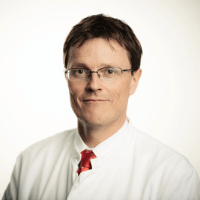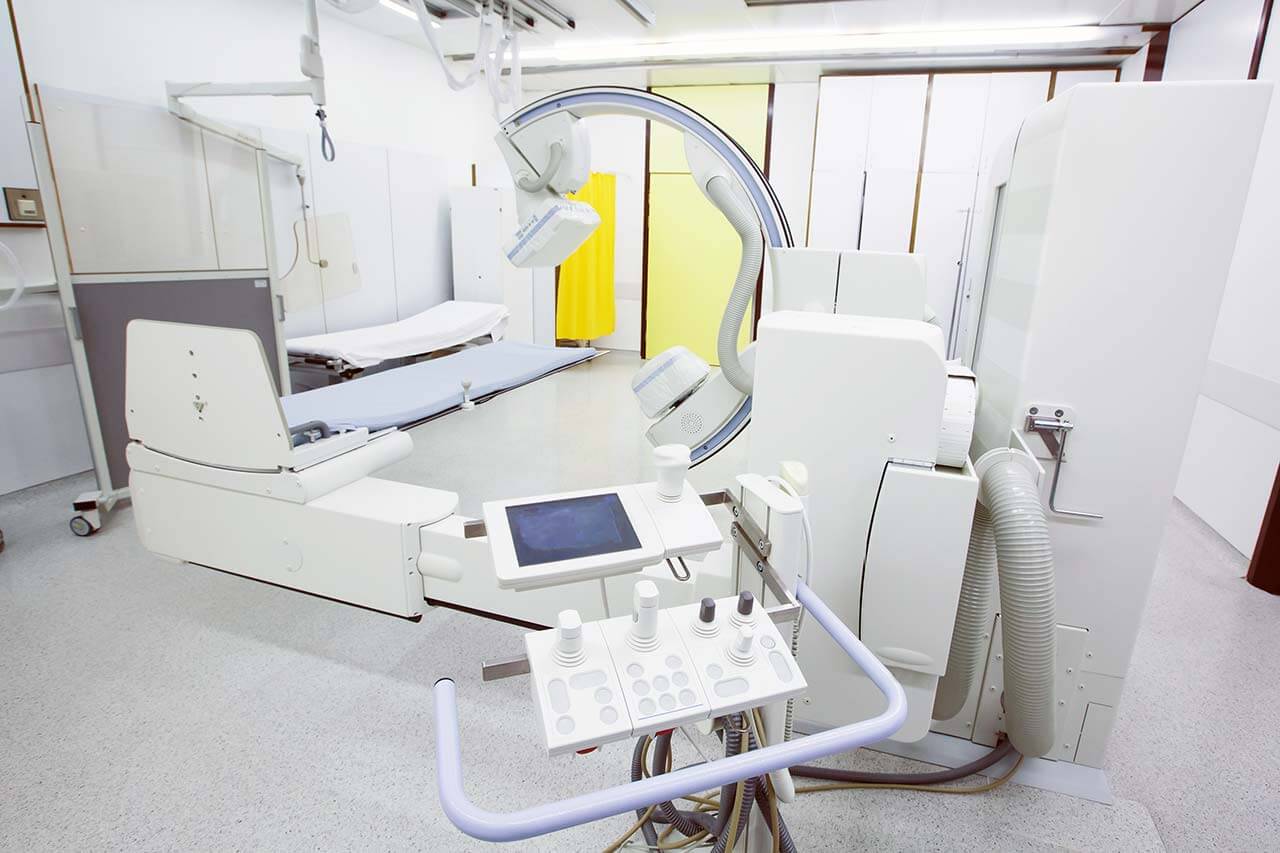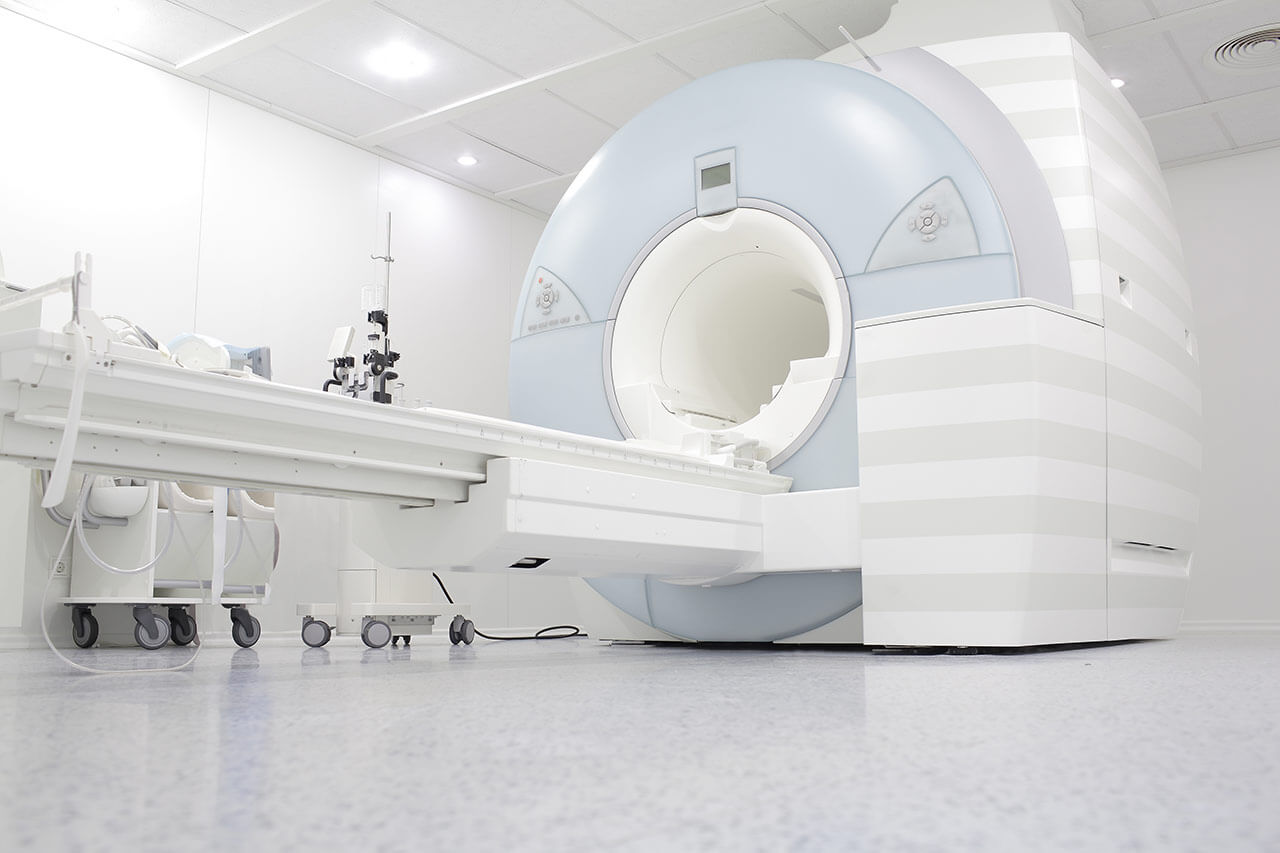
The program includes:
- Initial presentation in the hospital
- Clinical history taking
- Physical examination
- Laboratory tests:
- complete blood count
- biochemical analysis of blood
- TSH, free T3, free T4
- indicators of inflammation
- coagulation tests
- Renal scintigraphy
- Ga-68 DOTATATE PET/CT (if indicated)
- Lutetium-177-DOTATATE treatment
- Full body scintigraphy after 24 hours
- Full body scintigraphy after 48 hours
- Symptomatic treatment
- Cost of essential medicines
- Nursing services
- Stay in the hospital with full board
- Accommodation in 2-bedded room
- Elaboration of further recommendations
How program is carried out
During the first visit, the doctor will carry out a general physical examination and go through the results of previous laboratory and instrumental tests. After that, you will undergo the necessary additional tests such as the assessment of liver and kidney function, scintigraphy of the skeleton and salivary glands, somatostatin receptor imaging with Ga-68 DOTATATE PET/CT. This will allow the doctor to assess how effective the radionuclide therapy with Lutetium-177-DOTATATE will be and how well you will tolerate it. Also, the doctor will calculate your individual dosage of the radionuclide.
Radionuclide therapy with Lutetium-177-DOTATATE is carried out via intravenous administration of a solution with the radioactive isotope Lutetium-177-DOTATATE. The solution is injected through a catheter. This is a short procedure, as the infusion usually takes no more than 20 minutes.
During the procedure, you will need to apply cooling bags to the salivary glands, as Lutetium-177-DOTATATE partially accumulates in the salivary glands, affecting their function and causing dry mouth. You will also receive intravenous saline solutions and amino acid solutions to protect your kidneys.
After the infusion of Lutetium-177-DOTATATE, you will stay in a specially equipped (radiation-shielded) ward for 48 hours. The drug is quickly excreted by the kidneys, and after 48 hours you will no longer be dangerous to others. During these 48 hours, you can read, use a mobile phone, tablet or computer – all these devices will not be a source of radiation in the future.
Follow-up examinations include whole-body scintigraphy or computed tomography in 24 hours and 48 hours after the procedure. Based on the results of the examination, the doctor will determine whether one procedure is enough for you, or whether you will need to visit the hospital again. As a rule, 1-2 procedures are required for achieving a stable positive result. Procedures are carried out with an interval of 8 weeks.
Required documents
- Medical records
- Esophagogastroduodenoscopy (EGD), MRI/CT scan (not older than 3 months)
- Biopsy results (if available)
Service
You may also book:
 BookingHealth Price from:
BookingHealth Price from:
About the department
According to the Focus magazine, the Department of Nuclear Medicine at the Hannover Medical School ranks among the best medical facilities of its kind in Germany!
The department began its work in 1965, and therefore today it offers the full range of diagnostic and therapeutic services in the field of nuclear medicine. An experienced team of the department's doctors specializes in scintigraphy, PET-CT, radioiodine therapy, special types of radionuclide therapy for cancer, treatment of benign and malignant thyroid diseases. Of particular interest is radioisotope diagnostics of cardiovascular pathologies. The department has state-of-the-art equipment, thanks to which specialists in the field of nuclear medicine carry out accurate diagnostics and effective treatment. The focus of the department's medical team is on the patient and his individual needs. Doctors attach great importance to preventive radioisotope diagnostics, which can reliably reveal the slightest pathological changes at the molecular level. The Chief Physician of the department is Prof. Dr. med. Frank Bengel.
The department maintains partnerships with GE Healthcare (in the field of radioisotope diagnostics) and Siemens Healthcare (in the field of PET). The Hanover Medical School uses only modern diagnostic systems, as well as sparing and highly accurate treatment methods. The department can be proud of its excellent technical resources and the latest equipment. The department has at its disposal a Discovery NM 530c system for assessing the state of the heart and adjacent anatomical structures, a GE Discovery NM/CT 670 gamma camera for molecular examination of the whole body using a combination of scintigraphy and CT (used to identify oncopathologies, pathological changes in the skeletal structure, brain, lungs, kidneys, gastrointestinal organs, endocrine organs) and other equipment. Nuclear diagnostics is an indispensable part of modern medicine, since it can be used to identify pathological processes at the initial stages of development, when CT, MRI and other imaging methods do not reveal changes in an organ or anatomical structure. Due to the timely detection of pathology, doctors can achieve its complete cure or prevent progression, thereby preserving a decent quality of life for the patient.
Along with the full spectrum of radioisotope diagnostics, the department's main area of activity is targeted therapy with radionuclides. The department provides the very latest therapies, such as peptide receptor radionuclide therapy (PRRT) for the treatment of neuroendocrine tumors, therapy with PSMA ligands for the treatment of metastatic prostate cancer, as well as selective internal radiotherapy (SIRT) for the treatment of liver tumors. Since March 2014, the department has conducted the treatment with the new alpha emitter Xofigo® (Ra-223) approved for use in patients with hormone-resistant prostate cancer and bone metastases without detected abdominal metastases. The spectrum is complemented by radioimmunotherapy for the treatment of lymphomas, palliative pain therapy for the treatment of bone metastases, and MIBG therapy for neuroblastomas.
Quite often, the department's specialists admit men with prostate cancer. Such patients can undergo an innovative treatment – PSMA therapy. This type of treatment is indicated for the patients with advanced stages of the oncological process, with the presence of metastases. Prior to prescribing this form of treatment, the patient must undergo a PET/CT scan using PSMA ligands. This will help the doctor assess the potential benefit of PSMA therapy for prostate cancer. Kidney scintigraphy, blood tests and other diagnostic examinations are also carried out before the procedure. The essence of PSMA therapy is to inject a radioactive isotope into the patient's body, which recognizes cancer cells, fixes on them and ultimately destroys them. PSMA therapy allows achieving excellent results – about 70% of patients respond well to this type of treatment. The department's specialists have been carrying out PSMA therapy since 2013, so they have tremendous experience in this field.
Radioiodine therapy used to combat both benign and malignant thyroid diseases is an equally demanded treatment method. This type of treatment has been provided in the department since 2013, and the medical institution has become one of the first in Germany in the field of its application. The therapy is based on the introduction into the body of a radioactive form of iodine (I-131). Doctors mostly prescribe this type of treatment to patients with diffuse toxic goiter, thyroid adenoma and thyroid cancer. It is important that radioiodine therapy is absolutely painless – patients take the drug in the form of capsules or tasteless solutions. After entering the body, the isotope is concentrated in the cells of the thyroid gland and suppresses the synthesis of hormones. Both cancerous and healthy cells accumulate radioactive iodine well, which explains the use of therapy for the treatment of a wide range of thyroid diseases.
The range of diagnostic and therapeutic services includes:
- Diagnostics, including with the use of radioactive isotopes
- Native sonography
- Ultrasound Doppler scanning in one-dimensional mode
- CT scan without contrast enhancement
- Scintigraphy
- Functional radioisotope diagnostics of diseases of the kidneys, lungs, gastrointestinal tract, all parts of the skeleton in inflammations and tumors, diagnostics of the sentinel lymph nodes
- Single photon emission computed tomography (SPECT)
- PET and PET/CT
- Determination of the absorbed radiation dose
- Computer data processing with 3D reconstruction
- Therapy with the use of radioactive isotopes
- PSMA therapy for metastatic prostate cancer
- Selective internal radiation therapy (SIRT) in the treatment of liver tumors
- Therapy with the alpha emitter Xofigo® (Ra-223)
- Palliative pain therapy for the treatment of bone metastases
- Radioimmunotherapy for the treatment of lymphomas
- Peptide receptor radionuclide therapy (PRRT) for the treatment of neuroendocrine tumors
- MIBG therapy for neuroblastomas
- Radioiodine therapy for the treatment of benign and malignant thyroid diseases, including follow-up care
- Other medical services
Curriculum vitae
Higher Education and Professional Career
- 1988 - 1995 Study of Human Medicine and Doctorate at Friedrich-Alexander University Erlangen-Nuremberg.
- 1995 - 2000 Professional training for board certification, Department of Nuclear Medicine at the University Hospital Rechts der Isar Munich.
- 2002 Habilitation and Venia Legendi in Nuclear Medicine, Faculty of Medicine, Technical University of Munich.
- 2004 Invitation to a Position at Johns Hopkins University in Baltimore.
- 2005 - 2010 Associate Professor in Radiology and Nuclear Medicine, as well as Head of the Department of Nuclear Diagnostics of Cardiovascular Diseases.
- Since 2011 W3 Professor and Chief Physician of the Department of Nuclear Medicine at the Hannover Medical School.
- April 2020 Acting Dean for Research at the Hanover Medical School.
Research Interests
- The use of non-invasive methods of imaging diagnostics for the study of functional processes in the body (especially in the cardiovascular system).
- Development of indicator methods for imaging molecular and cell-specific target structures (on a heart model).
Prizes, Awards and Honors
- 2002 Tyco Healthcare Encouragement Award and Brahms Research Award of the German Society of Nuclear Medicine.
- 2011 Hermann Blumgart Award of the Society of Nuclear Medicine and Molecular Imaging.
- 2013 Simon Dack Award of the American College of Cardiology.
- 2014 Zaret/Beller Award of the American Society of Nuclear Cardiology.
Memberships in Professional Societies
- 2009 - 2010 President of the Council on Cardiovascular Diseases of the Society of Nuclear Medicine and Molecular Imaging (SNMMI).
- 2004 - 2008 Chairman of the Committee on Cardiovascular Diseases of the European Association of Nuclear Medicine (EANM).
- 2006 - 2010 Chairman of the Working Group on Nuclear Diagnostics of Cardiovascular Diseases of the German Society of Cardiology (DGK).
- 2006 - 2010 Board Member of the American Society of Nuclear Cardiology (ASNC).
- 2012 Fellow of the American Heart Association.
- 2013 - 2016 Board Member of the German Society of Nuclear Medicine (DGN).
- 2015 President of the Congress, Annual Meeting of the German Society of Nuclear Medicine (DGN).
Photo of the doctor: (c) Medizinische Hochschule Hannover (MHH)
About hospital
The Hannover Medical School has the status of a leading German medical facility. The advanced medical technologies, highly qualified specialists, as well as productive research activities form a solid basis for top-class medical service of the world standard. The hospital is proud of its outstanding achievements in the treatment of cancer, diseases of the lung, heart, kidney, liver and metabolic disorders, as well as surgical diseases.
The medical facility diagnoses and treats more than 63,000 inpatients and about 470,000 outpatients annally. These indicators are growing steadily, which indicates the reputability and prestige of the hospital in the European medical arena.
For decades, the hospital has been a pioneer in transplantation medicine and is one of the leading centers of this specialization in the world. It performs about 400 transplantations of solid organs annually. Also, the hospital has performed over 130 bone marrow transplantations. In addition, the hospital ranks among the world leaders in cochlear implantation for the treatment of hearing loss.
Much attention is paid to interdisciplinary cooperation. Since 2016, the hospital has the largest certified Cancer Center in the Federal State of Lower Saxony, which provides comprehensive, multidisciplinary medical care in accordance with the standardized protocols of cancer societies.
The specialists of the hospital offer patients not only modern treatment of the highest quality, but also attentive care, sympathetic attitude to the patient's problems and understanding of his individual needs. Thus, the patient can be sure that his health is in the safe hands of highly qualified doctors.
Photo: (c) depositphotos
Accommodation in hospital
Patients rooms
The patients of the Hannover Medical School live in comfortable and cozy rooms. Each patent room has an ensuite bathroom with shower and toilet. A standard patient room includes an automatically adjustable bed with an orthopedic mattress, a bedside table, a wardrobe, a TV and a telephone. You can use TV, telephone and Internet using a special chip card, which can be purchased at self-service terminals or ordered at the service counter. The hospital allows the patients to use mobile phones, with the exception of intensive care units, some departments and diagnostic rooms.
If desired, the patient can stay in an enhanced-comfort room. Such rooms are distinguished by a more sophisticated design, and are additionally equipped with upholstered furniture, a safe for storing valuables and a mini fridge.
Meals and Menus
The patient and the accompanying person are offered delicious and balanced three meals a day. Breakfast and dinner are served buffet style and lunch can be chosen from three set menus. All dishes are prepared by professional chefs using the freshest ingredients available in the region.
If you are on a specific diet for some reason, you will be offered an individual menu. Please inform the medical staff about your dietary preferences prior to the treatment.
Further details
Standard rooms include:
Religion
There is a chapel on the territory of the hospital, where Christian and Catholic services are regularly held. The hospital provides a prayer room for followers of Islam, which is open for visits 24 hours a day.
Religious services can also be provided upon request.
Accompanying person
During an inpatient program, an accompanying person can stay with you in the patient room or in a hotel of your choice.
Hotel
During an outpatient program, you can stay in a hotel of your choice. The managers will help you choose the most suitable options.




